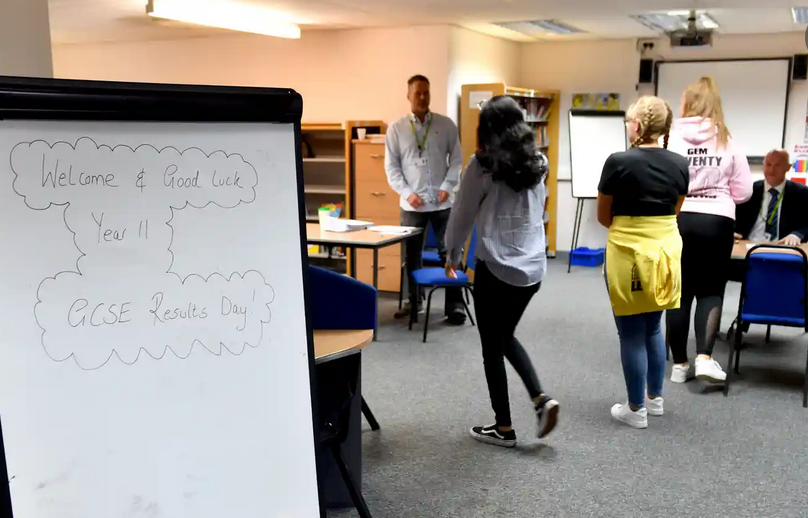Let’s use this exams debacle to transform England’s schools
There are two ways of responding to the debacle around exams this summer, which continued this week with the release of GCSE grades and the last-minute delay of BTec results. The first is urgent if more narrowly political task: the need to hold accountable those who were responsible for the misjudgments and institutional failures that led us down this worrisome, chaotic path. The second is more imaginative, which is to recognize the unique potential of this moment to transform the national conversation about education.
Over the past few months, we have witnessed an unprecedented explosion of public understanding about how the education system actually works, and the unfairness it entrenches. Soon after the start of lockdown, many people witnessed the glaringly obvious facts of educational inequality, grasping the role that a person’s home background plays in their school achievement, or the lack of it.
Whether it is parents who are too overburdened or under-confident, or a lack of internet access, home computer, or quiet study space, it took a virus to expose a galling truth of post-austerity Britain: that children from poorer homes face huge inbuilt disadvantages when it comes to schooling.
The recent controversy around the A-level algorithm in England uncovered something more subtle: how using a mathematical model to ensure a broadly similar distribution of exam results year on year required, in effect, to decide ahead of time which schools were to succeed and which to fail. But of course, as the Association of School and College Leaders told me, we had “fixed in aspic” the distribution of grades – and every year, we “consign a proportion of young people to leaving school feeling that they have fallen short”. It’s just not every year that this gets exposed for all to see.
Unfortunately, for the government and Ofqual, the computers couldn’t factor in the public impact of furious parents threatening judicial review or the thousands of teenagers refusing to accept the calculations they received. And then – who would ever have guessed it? – teachers, and the quality of their professional judgments, moved to the centre of national debate.
There will be some who claim the U-turn over centre-assessed grades (CAGs) was a capitulation to an insufficiently rigorous profession that can’t be trusted with anything as important as school standards. Sadly, this has been the general trend of official thinking since Jim Callaghan’s famous 1976 speech at Ruskin College, Oxford, when the former Labour leader questioned the postwar consensus around the role of teachers in curriculum and assessment. Successive governments have turned the screw on teachers, increasing the pressure while reducing the role of independent judgment and driving out thousands from the profession every year as a result.
None of this is a revelation to those who work in education. But fresh public understanding could spur those who are arguing for changes to the ways that schools are assessed, and for reforms of the exam system – particularly GCSEs. As its name suggests, the General Certificate of Secondary Education, first introduced in 1988, has outgrown its original role. A certificate designed to serve as a final record of achievement for those who once left school at 16 now has little or no meaning when all pupils stay on until 18.
Calls for reform of GCSEs and A-levels have a long history. In 2004, the former chief inspector of schools, Mike Tomlinson, led a review that proposed an overarching diploma to replace GCSEs, A-levels and vocational qualifications. Failure to heed these proposals was one of the great missed opportunities of the New Labour era that opened the door to coalition reforms. The Conservative idea of educational reform was simply to make all exams much harder, in line with a mythically monolithic private education system based on tough discipline and top marks – and far superior resources, of course.
Discontent at Michael Gove’s reforms of our public exam system has been steadily growing. School leaders, teachers, and pupils tell regularly of how dull exam material is, how stressful and archaic the formula, how unfit for purpose. A third of pupils, most of them from disadvantaged backgrounds, fail to reach the required standard – that is a level 4 – in the reformed exams for English and maths. They come away not highly educated but deeply discouraged.
We can’t even trust the accuracy of those numbers. An Ofqual study in 2019 revealed the astonishingly high probability of an A-level candidate not getting the correct grade in subjects where the examiners’ subjective judgments had more play. The chance of error in English and history exams was between 42% and 48%; for sociology, it was 37% and for geography 35%.
Those now supporting the abolition of GCSEs include some unlikely but powerful figures, including Robert Halfon, the Conservative chair of the education select committee, and Kenneth Baker, the architect of the Thatcherite 1988 Education Act. This autumn a coalition of independent and state school heads will propose the replacement of GCSEs by a more sophisticated and flexible set of assessments.
But more is needed than a fresh set of proposals. Political discussions about education have been hijacked by a narrow group of interests, using narrow criteria that insist standards are best served by cliff-edge testing and strict rankings. We need a new language to describe and identify the purpose of young people’s school years.
Heads and teachers know from experience that flexible and imaginative approaches to learning and assessment drive up standards. It’s teachers, rather than politicians, who must now lead the debate away from raw numbers, statistical models, and distrust. Exams should be an element of a far broader suite of intellectual challenges, including coursework, extended projects, oral presentations, and hands-on practical work.
At the heart of these reforms should be an aim to restore what the writer and teacher Ron Berger calls “work that matters”. If the pandemic and the ensuing exam chaos have resulted in anything positive, it’s that the wider public is finally ready to listen.
Source: https://www.theguardian.com/commentisfree/2020/aug/20/exams-a-level-england-schools-teachers-education?utm_term=b258af2e78cdc96674b147714926c2bf&utm_campaign=TeacherNetwork&utm_source=esp&utm_medium=Email&CMP=teacher_email




